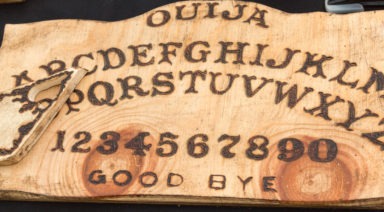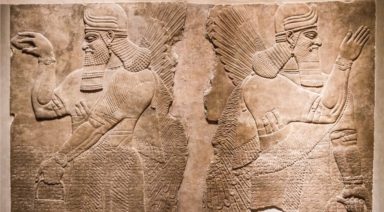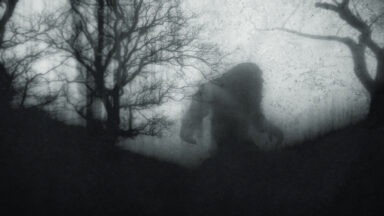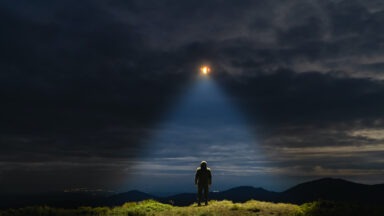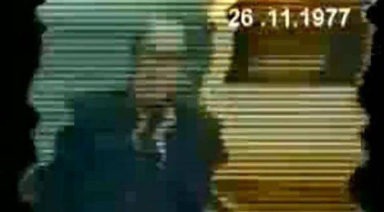Aleister Crowley: The Wickedest Writer in the World
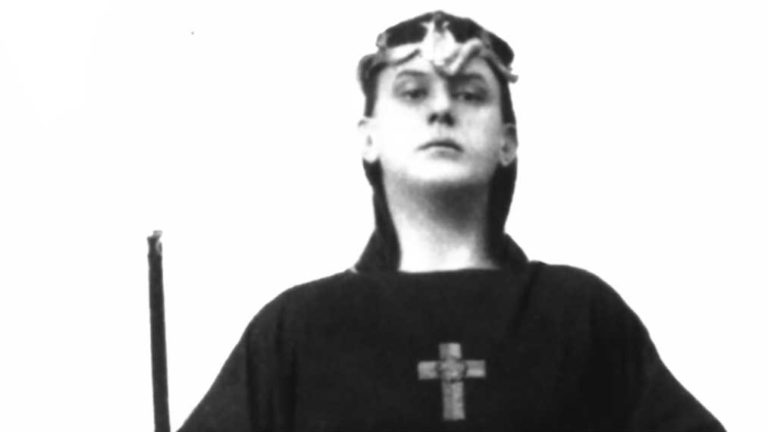
Known as “the wickedest man in the world,” English occultist and author Aleister Crowley actively embraced and contributed to his own notoriety. He delighted in shaking up social status quos, and used his infamy to draw a veil over, and at the same time draw attention to his esoteric work.
Crowley (b. 1875) died in 1947, leaving 61 books, some published during his lifetime — others published posthumously in the 1970s, 80s and 90s. Crowley’s books enjoyed a revival, and Crowley himself achieved cult status during the expanding consciousness revolution beginning in the late 1960s.
Crowley was a prolific writer, and during his life wrote about the Qaballa, yoga, and the “Goetia,” attributed to the biblical King Solomon. He also penned commentaries on Thoth, “the Tarot of the Egyptians,” and the esoteric use of drugs to name but a few.
Crowley the Drug Fiend
The 1922 novel, “Diary of a Drug Fiend” was, according to Crowley, “A true story, rewritten to conceal personalities.” In his quest to understand the influence of different types of drugs on the mind, Crowley was captured by heroin, documenting that struggle in “Diary of a Drug Fiend.” He also experimented with and wrote about psychoactive substances, including absinthe (The Green Goddess, 1917), hashish (The Psychology of Hashish, 1909), and cocaine (Cocaine, 1917). Crowley also published “A Pharmaceutical Study of Cannabis Sativa” by E.P. Whineray in his March, 1909 issue of his journal The Equinox.
Ever in search of peak experiences, epiphanies, and absolute insight, Crowley advocated incorporating drug use into all magickal ceremonies, demonstrating his drive to experience expanded consciousness by any means necessary. He believed that the use of these substances would succeed where religion and science had failed to solve the rubric of the true nature of reality.
The Moonchild
Published in 1929, “The Moonchild” was another work of fiction based on actual people and events. Characters based on the famous and infamous of the time were given fictitious names — Dancer Isadora Duncan appeared as Lavinia King, and inventor of the Rider-Waite tarot, A.E. Waite, appeared as Arthwaite.
The work is the story of a war between dark and light magicians over an unborn child imbued with a special soul — the moonchild. The book embraces the WWI geopolitics of the time — in the end, the white magicians become associated with the Allied forces and the dark sorcerers affiliate with the “Central Powers.”
Thelema and the Book of the Law
While Crowley was a prolific writer and commentator, it was the mystery religion Thelema that he viewed as his most significant legacy. Adherents were known as “thelemites,” and their “bible” was “The Book of the Law.” Famously, the fundamental message of Thelema was, “Do what thou wilt shall be the whole of the law.” The only modifier was “Love is the law, love under will.”
The Thelemic concept of “true will” in the context of “Do what thou wilt” was seen as the impulse and drive created by inborn destiny; the blueprint of the divine. The goal was to defeat and eliminate habitual unconsciousness, false perceptions and desires, and any other distractions from the divine will within. Crowley sought a method to discover a child’s true will at the time of birth, believing that if this was accomplished, it was a simple thing to establish a “correct” social order based on divine will.
Crowley stated that the Book of the Law was dictated by an entity named Aiwass, but Nuit, Hadid, and Ra-hoor-Khuit appear to give dictation as well. Later, Crowley asserted that Aiwass was, in actuality, his “Holy Guardian Angel.”
The Holy Guardian Angel
Crowley’s Holy Guardian Angel (HGA) is borrowed from Catholicism — one Catholic prayer reads,
“Dear angel at my side, you have been with me since I was born.
You are my own personal guardian given me by God as my guide and protector.”
The HGA is mentioned again in a German 15th century ceremonial magic text written by Abraham of Worms, known as a Cabalist. Later the text, titled “The Sacred Magic of Abramelin the Mage,” was translated by members of the Order of the Golden Dawn — Crowley had been a member prior to founding his own Order of Thelema.
When Crowley left the Golden Dawn, he took the concept of the Holy Guardian Angel with him, embracing it as, “The central and essential work of the magician.” As far as he was concerned, to meet the HGA was to also have clear insight into one’s predestined “will.” Crowley sought “knowledge and conversation” with the HGA, and taught that it could take a lifetime of work to discover and communicate with the HGA.
Crowley believed that the complex methods of reaching the HGA from the Abramelin the Mage text were overly intricate and time-consuming, although he admitted that his methods were devised to “intoxicate and anaesthetize him [the practitioner] so that he may not feel and resent the agony of this spiritual vivisection.” He gave his instructions for contacting the HGA in his work “Magick Without Tears.”
Some have likened Crowley’s HGA to the daimon of Greek mythology — a guiding spirit that brought a protective presence. To Plato, daimons were spirits that watched over their human, corresponding to the idea of a higher self.
Gematria: Understanding the Numerical System that Decodes the Divine

Have you ever thought that numbers might tell stories just like words do? Gematria, a fascinating form of numerology found in Kabbalistic teachings, suggests that there’s a deep connection between numbers and words.
This ancient method, deeply rooted in sacred texts, proposes that every letter and word carries a numerical value that unveils deeper meanings. These connections might even offer clues to understanding both historical and future events through sacred texts like the Torah.
The concept of gematria numerology stems from the idea that mathematics is the universal language of nature and within it may be the keys to explaining our universe or evidence of supernatural power. Marty Leeds has taken this concept of the Kabbalistic gematria and applied it to the English language, believing that he has found a cipher in our alphabet to prove this theory.
What is Gematria?
Gematria is a numerological system where each letter of the Hebrew alphabet is assigned a specific numerical value. This system is used to interpret the hidden meanings within words, names, or phrases, based on the belief that God created the universe through the numerical values of Hebrew letters.
This practice, deeply rooted in the mystical aspects of the Hebrew Bible and embraced within Kabbalistic traditions, transcends simple word-to-number correspondences. It serves as a profound tool to explore the divine blueprint encoded within sacred texts, suggesting that every letter and word carries an intrinsic numerical value that reveals deeper, spiritual insights.
Modern scholars, including Marty Leeds, have extended the principles of gematria beyond Hebrew to the English language, proposing that these numerical ciphers uncover universal truths and mystical insights across different languages and cultures.
How Does Gematria Work?
The idea behind gematria numerology is that mathematics is a universal language, which might hold the keys to explaining our universe or even pointing to the existence of supernatural powers. In the practice of gematria, each Hebrew letter’s numerical value allows scholars and mystics to draw connections between words and uncover deeper meanings. These numerical values can also reflect broader concepts and beliefs. For instance:
- Number 888: In Christian numerology, the number 888 represents Jesus, or more specifically Christ the Redeemer. This comes from the fact that in Greek gematria, the letters of Jesus’ name add up to 888. This number is seen as a representation of infinite love and redemption.
- Number 666: Often recognized as the number of the beast from the Book of Revelation in the New Testament, 666 is associated with evil and Satan in popular culture. However, in the context of gematria, this number can have more complex interpretations depending on the scriptural and cultural context.
- Number 4: The number 4 is often seen as a symbol of stability and order in many cultures. In the context of gematria, it can represent the four elements (earth, water, air, fire), the four cardinal directions, or the foundational aspects of creation. This reflects its universal significance in forming the basis of the world’s structure.
- Number 33: This is a number with significant importance in Freemasonry where it signifies the highest degree of the Scottish Rite. In Kabbalistic tradition, it can represent the age at which Jesus was crucified and, by extension, a period of accomplishment or completion.
For example, the tzitzit, a shawl worn during Jewish ceremonies, provides a perfect illustration: the numerical value of its knots and strands adds up to 613, which intriguingly corresponds to the total number of commandments in the Torah. These numerical associations are believed to hold deeper spiritual or mystical significance, revealing connections that go beyond the surface and delve into the divine or universal truths.
What is Gematria Used For?
Gematria is not just about playing with numbers; it’s a tool embedded in the Kabbalistic tradition to interpret deeper meanings within sacred texts. Scholars use it to uncover insights about life, the divine, and cosmic mysteries. Beyond Judaism, gematria also appears in other cultures and languages, demonstrating its widespread influence and importance in various religious and philosophical traditions.
Exploring the Origins of Gematria
The practice of gematria is believed to have originated in the Jewish mystical tradition known as Kabbalah, but its influences can be traced back even further to ancient Greek and Arabic cultures. The practice was likely influenced by Greek isopsephy and Arabic abjad numerals, which also connect letters with numerical values. These practices highlight a universal quest to find deeper meaning in language and numbers across different cultures and historical periods.
Gematria in Different Cultures
While Hebrew gematria is most prominent, similar numerological practices exist in other cultures such as Greek and Arabic. These systems adapt to the peculiarities of their own languages and scriptures, providing a broad field of study for numerologists worldwide. The Greek system, for example, has been referenced by philosophers like Plato, showing gematria’s influence on early philosophical thought.
Examples of Gematria in Practice
- Biblical Texts and Jewish Tradition: Gematria is often used to interpret the Hebrew Bible. For instance, the Hebrew word for ‘life’ (חי) sums to 18, making it a significant number in Jewish culture.
- Modern Applications by Marty Leeds: Leeds argues that even the English alphabet can be broken down into numbers that reveal hidden codes, blending traditional and contemporary interpretations of gematria.
Kabbalistic Connections
In Kabbalah, gematria is not merely a numerological curiosity; it is an essential tool for exploring the esoteric and mystical dimensions of Hebrew scriptures. This practice is particularly valuable for interpreting the hidden meanings behind the names of God, such as the Tetragrammaton (YHWH) and other sacred words.
Kabbalists believe that each letter in these divine names carries specific numerical values that are direct expressions of cosmic energy and divine attributes. By decoding these numbers, mystics can gain insights into the fundamental structures of existence and the inner workings of the cosmos.
The use of gematria in Kabbalistic studies is seen as a method of interpretation and a form of meditation and spiritual practice, aimed at bringing practitioners closer to divine wisdom.
Key Aspects of Kabbalistic Gematria:
- Interpretation of divine names and cosmic energy
- Insights into the fundamental structures of existence
- Meditation and spiritual practice to connect with divine wisdom
Practical Uses of Gematria Today
While its roots are ancient, gematria has evolved to meet the needs of modern society. Today, it finds applications in various personal and practical contexts:
- Event Planning: Individuals use gematria to select auspicious dates for significant events, such as weddings or business openings. Aligning activities with favorable numerical values is believed to influence outcomes positively.
- Personal Insight: Gematria is used to analyze personal names, birth dates, and keywords, helping individuals uncover deeper spiritual meanings and potential life paths.
- Creative Applications: Artists and writers often use gematria to structure their works around specific numerical themes, adding a layer of symbolic significance to their creative outputs.
- Digital Accessibility: In the digital age, the principles of gematria have been adapted for online use, making this ancient wisdom accessible globally and allowing its exploration across different languages and cultures.
The Ongoing Relevance of Gematria
Gematria’s roots stretch deep into Kabbalistic mysticism and have branched out into modern linguistic studies. It remains a vital tool in the study of sacred texts and offers a unique perspective on the numerical patterns that many believe govern the universe. Whether used for spiritual discovery, theological study, or philosophical exploration, gematria captivates those who seek to understand the intersection of numbers and words in various cultures.
Gematria FAQs
How do you calculate words using gematria?
Calculating a word’s gematria value involves adding up the numerical values of each letter in the word. Different traditions may have their own set of values and methods, adding a layer of complexity to the calculations.
What is a Gematria Calculator?
A Gematria calculator is a digital tool that simplifies these calculations, allowing users to quickly find the numerical value of words and phrases across different Gematria systems.
How does gematria work in the Hebrew language?
In Hebrew, each letter is assigned a numerical value, and these numbers are used to explore relationships and uncover deeper symbolic meanings between words, based on their numerical equivalence.





